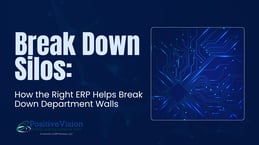
Did you know that an ERP can help bring down workplace silos? You know the ones - the ones that are keeping your departments from communicating. The ones causing bottlenecks. If your departments are working in their own little bubbles, it’s making things way harder than they need to be.
In today's business world, you can't afford to have sales doing their thing while operations is off doing something completely different, with nobody talking to each other. It's time to tear down those walls and get everyone on the same page.
Here's the thing: the most successful companies have figured out that sales, marketing, finance, product development, manufacturing, and service all need to work together. It's essential if you want to stay competitive. An enterprise resource planning (ERP) system is what helps make it happen.
An ERP Helps Everyone Communicate Better
Silos happen when departments become insular. They’re busy working on their own projects and lack an easy way to communicate and share with others. Collaboration? That happens rarely, if at all.
Now, what can help teams collaborate better? Technology that actually works together. If each department has its own fancy software that doesn't talk to the others, you're basically recreating the same silos you're trying to eliminate. It's like having the best phones in the world but no cell towers to connect them.
That's where an ERP (enterprise resource planning) system comes in handy. It's basically the hub that connects all your departments, processes, and data. When everyone's working from the same information, magic happens—things run smoother, people get more done, and your bottom line looks a lot better.
Already have an ERP? Great! But are you really using everything it can do? Let's walk through how different departments can make the most of it:
- Sales: Your sales team is out there talking to customers all day. Why not give them mobile access to your ERP? They can close deals on the spot, add customer notes, process payments—all while they're still in the field. And the best part? That information instantly flows back to everyone else who needs it.
- Marketing: When marketing can see what's actually selling (and what's not), they can adjust their strategy on the fly. Your ERP gives them real numbers about product performance and customer trends, so they're not just guessing.
- Finance: Your finance team needs accurate numbers, and they need them now. With an integrated ERP, they're not waiting for someone to manually enter data from five different places. Everything flows in automatically, so they can focus on the actual analysis instead of data entry.
- Operations: Here's where things get really interesting. When your warehouse and manufacturing systems connect to your ERP, inventory updates happen in real-time. No more "oops, we thought we had 100 of those but actually we only have 5" moments. That means fewer shipping mistakes, happier customers, and better inventory management all around.
- Field Service: Your technicians in the field need information right now—not when they get back to the office. Give them mobile access to your ERP, and they'll be more productive, more efficient, and your customers will be much happier.
ERPs connect all of these departments into one cohesive system. If the system is cloud-based, updates to one part of the system spread almost instantaneously to others. These “real-time” updates ensure that data from all departments flows seamlessly through the ERP. Anyone, at any time, can draw from this data for their work, creating better sales and marketing workflows, smoother operations, enhanced financial insights, and better customer service.
IT Consulting in Chicago for ERP Needs
If you're tired of watching your departments work in isolation, we'd love to help. At PositiveVision, we offer IT consulting in Chicago and work with small and mid-sized manufacturing and distribution companies just like yours. We specialize in ERP systems like Sage 300 that bring everything together: accounting, business intelligence, CRM, warehouse management, HR, you name it.
When everyone has access to the same real-time information, your whole team can finally work together the way they should. Let's make it happen! Contact us today.



 © 2019 PositiveVision • 219 E. Thorndale Ave. Roselle, IL 60172
© 2019 PositiveVision • 219 E. Thorndale Ave. Roselle, IL 60172